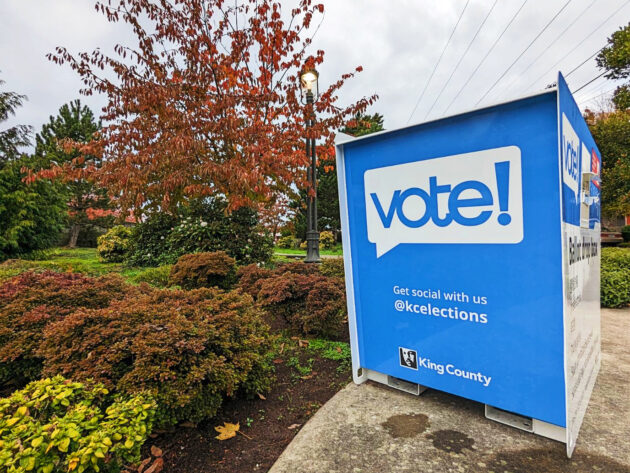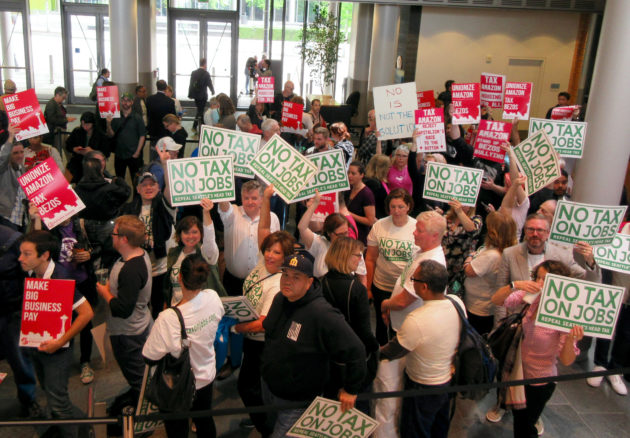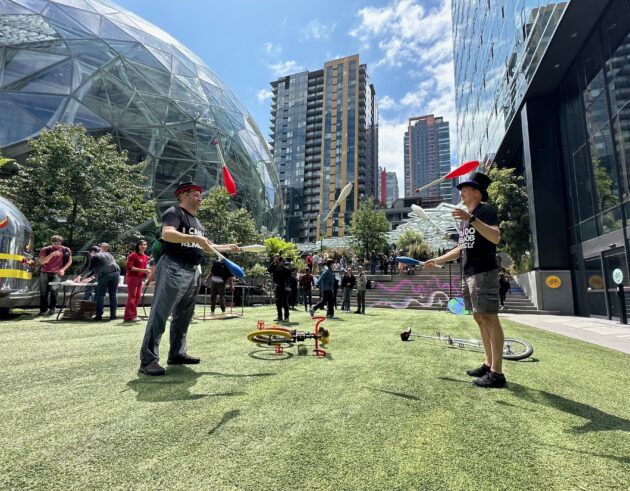
After repeatedly sparring with the Seattle City Council, Amazon in 2019 poured $1.45 million into the coffers of council candidates in a move that drew condemnation from U.S. senators and triggered protests by those who accused the company of trying to buy the election. It was a PR disaster and the mission was largely thwarted: only two of the seven candidates supported by Amazon won.
Four years later, Amazon is working from a different playbook.
This time Amazon is mum on city council endorsements. It’s banned from donating thanks to legislation approved by the council in January 2020 prohibiting “foreign influenced” companies from contributing to local candidates. In the intervening years, Amazon has been actively burnishing its local image, stepping up philanthropic efforts and funding affordable housing.
“We are seeing them essentially take some of the lessons from that previous failure,” said Alex Hays, a political consultant based in Olympia, Wash.
“We are seeing them essentially take some of the lessons from that previous failure.”
– Alex Hays, political consultant
Jon Scholes, president and CEO of the Downtown Seattle Association, said Amazon has “changed their practice” this election. He also defended the company’s past participation.
“I don’t think anybody should apologize for that,” Scholes said. “We have pretty restrictive public campaign and public finance laws and disclosures on the books, so everybody knows who is investing and how much.”
Amazon, which declined to comment for this story, hasn’t backed away entirely from local politics.
The company last month donated $25,000 in support of the Seattle Housing Levy, a ballot measure renewing and increasing a property tax that funds affordable housing. David Zapolsky, Amazon senior vice president and general counsel, also contributed $2,500 to the effort, according to public records.
Amazon employees are personally donating to city council candidates, but their support is muted as well.
Zapolsky and 16 other Amazon employees have directly donated $5,050 to city council races — though the actual numbers are almost certainly higher as the vast majority of donors don’t list their employer. Zapolsky also contributed $7,500 to independent political committees that back candidates.
By comparison, in the 2019 election cycle more than 300 Amazon employees donated a total of about $143,000 to Seattle candidates and political action committees. The company promoted employee engagement, even holding a candidates’ forum ahead of the election.
Business interests in general are still ponying up for this year’s council races through donations to independent political committees. Big donors include trade groups representing builders, commercial real estate, and hotel and restaurant businesses as well as a transportation company.
One of their key targets is city council candidate Maren Costa, a former Amazonian who was fired over her climate activism. Her opponent, Rob Saka, is a former attorney for Meta. One of the business-backed PACs has bankrolled nearly $200,000 to defeat Costa, while union-funded efforts have spent $106,000 in her favor. The PAC opposing Costa has spent almost $18,000 in support of Saka.
‘Brutal failure’

The affordable housing and homelessness crisis that is crushing the Seattle area today was already raising alarms back in 2015, prompting the city to declare an emergency.
The region’s burgeoning tech sector and its influx of high-paid workers were called out by some for driving up housing prices and stoking income inequality. As homelessness worsened, Amazon became a popular scapegoat.
By 2017, the Seattle City Council began proposing taxes on the city’s top-grossing businesses to help fund housing programs. In 2018, it passed and quickly repealed a controversial “head tax” targeting high-revenue companies. The issue sparked heated debates and chaotic rallies with Amazon as a focal point.
One side — led by councilmember Kshama Sawant — cast Amazon as a villain, arguing that the company wasn’t paying its fair share of taxes and needed to contribute more to help solve problems it was exacerbating.
The other side defended the tech giant as a key contributor to the local economy and source of good paying jobs.
“Seeing things go so poorly [on homelessness], the political class wanted to blame someone and they blamed Amazon,” said Hays, who typically consults on campaigns for Republican or center-right candidates.
When the 2019 election season rolled around, a bruised Amazon came out swinging.
It donated $1.45 million to the Seattle Metropolitan Chamber of Commerce’s political action committee, which supported a slate of candidates viewed as more business friendly, with the No. 1 goal of defeating Sawant.
It didn’t pan out.
“It was just a brutal failure,” Hays said.
The company couldn’t shake the demonized portrayal pushed by its critics. It hadn’t done enough in the preceding decades to engage in civic and community issues, Hays said. It could have built a reputation as a “good corporate actor,” he said, and established a favorable position from which to defend itself.
Even Sawant’s opponent, who received the biggest expenditure from the chamber’s PAC, blamed Amazon for his defeat, calling out the public backlash triggered by its campaign contributions.
Looking ahead

Following the 2019 election, the city council quickly passed the Clean Campaigns Act, which bans companies with at least 5% foreign ownership from donating to political candidates — a designation that applies to Amazon.
Also in 2020, the council approved JumpStart Seattle, a payroll tax that currently applies to companies with yearly payroll expenses of $8.1 million or more. The tax went into effect in 2021 and impacts fewer than a dozen of businesses, mostly in the tech sector — including Amazon.
“I do think things are better. The temperature is down.”
– Rachel Smith, CEO and president of Seattle Metropolitan Chamber of Commerce
While business leaders still oppose the JumpStart tax — earlier this year they lobbied unsuccessfully to suspend it — the tension between some of the city leaders and Seattle’s largest employers has simmered down.
“I do think things are better,” said Rachel Smith, CEO and president of the city’s chamber of commerce. “The temperature is down.”
“On balance, it’s better,” Scholes agreed. “But I think there’s still certainly council members that want to point the finger at the private sector and companies, Amazon included, for some of their own failings.”
Seattle Mayor Bruce Harrell, who was elected in 2021 and formerly served on the city council, is among the leaders seeking collaboration with the business community.
“Since taking office, Mayor Harrell has been very intentional in his efforts to communicate, strengthen relationships, and build trust with Seattle’s major employers, including Amazon,” said Harrell spokesperson Karissa Braxton via email.
Another development that might have helped cool the hostilities: Sawant opted not to run for a fourth term, shifting her attention to a national movement for workers’ rights.
Election day is Nov. 7. Ballots must be postmarked by the 7th or returned to a ballot drop box by 8 p.m. for the General Election.

